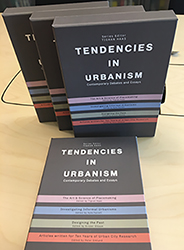Book release: Tendencies in Urbanism - Contemporary Debates and Essays

Interest in urbanism and cities has exploded in the past 25 years. Urbanisms of many kinds have entered the scene of practice and academia, public debate, politics, media and writings. Each one of these “paradigms” (sustainable, post, new, everyday, etc.) is staking out its claim and view on the urban realm, often attached to and reflective of, broader social, cultural and political issues at hand. The differences in these “isms” are fundamental, consistent, systemic and deep. A number of academic writers and scholars have (re)conceptualized the trends/ideals/paradigms and processes in the urban and social transformation of cities into a series of stable categories – different urbanisms. Their characteristics provide a frame of reference for research, practice and policy debates about the trajectory of contemporary urban planning and design thought.
The research project has mapped a number of theories, approaches, paradigms and ideologies have influenced the contemporary practice of urban planning & design and those effects can be seen in the form of our built environments. Dominant ideals within today’s urban planning and urban design discourse have been examined and defined in various ways - as territories of urban design (Krieger, 2006), as urban design force fields (Fraker, 2007), as integrated paradigms in urbanism (Kelbaugh, 2008), as urbanist cultures and approaches to city-making (Talen, 2005), as new directions in planning theory (Fainstein, 2000), as four urbanisms (Schwarzer, 2000) as typologies of urban design (Cuthbert, 2006), as opportunity urbanism (Kotkin, 2007), as city design modernist, traditional, green, and systems perspectives (Barnett, 2011), five ideals in urban planning & design (Olsson and Haas, 2014) and plural urbanism (Ryan, 2017). Haas and Olsson argue that five leading ideals that stand out clearly in international practice and current academic urban design discourse are New Urbanism, Post Urbanism, Green Urbanism, Re-Urbanism, and Everyday Urbanism.
This research project wants to show, in the vein of Professor Mathew Carmona’s reasoning (UCL Bartlett) that ‘In the future, the quest for sustainable place-making may and should transcend all these urbanisms. The aim would be to engage with ideas while avoiding being distracted by ideology and ideologues. Rather than high art, the design in urban planning and design should be best understood as a problem-solving process’. This relates that each specific problem and case as well as (local) context need tailor made solutions with desirable (generic) principles of good urbanism and of place-making; their application being tempered by, and contingent upon, the realities of the local situation. The output will be a collection of books (Contemporary Debates and Essays) from different viewpoints and from leading scholars in the field (Helsinki and Stockholm Publishers, 2018); a series of seminars, lectures, debates and roundtables; a key book on Placemaking Urbanism & Beyond (Rizzoli, New York, 2020) and a series of scientific journal papers on various ideals in urbanism.
